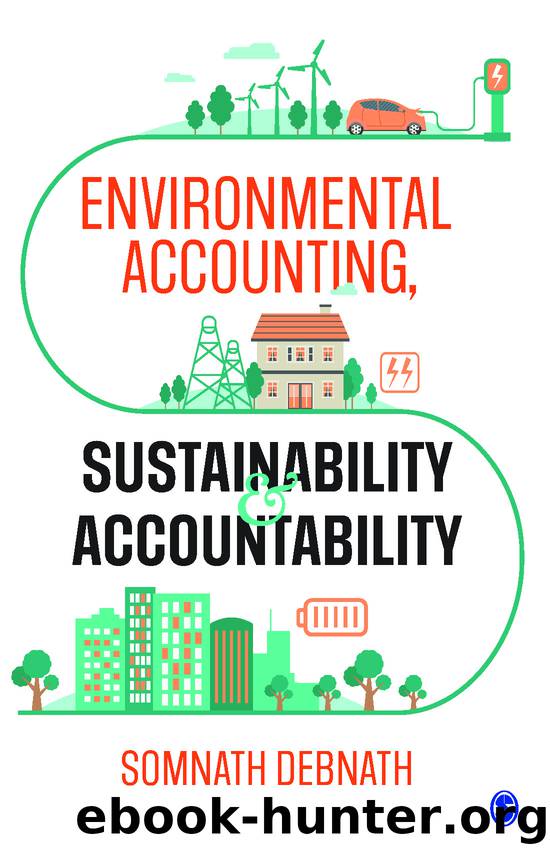Environmental Accounting, Sustainability and Accountability by Debnath Somnath;

Author:Debnath, Somnath;
Language: eng
Format: epub
Publisher: SAGE Publications
Figure 10.1 Accounting paradigms of sustainability as part of accounting frameworks
Source: Author.
Sustainability and accounting paradigms
Sustainability-related concerns due to the economic activities of firms and industries correspond to the ecological impacts produced by the firms that firms should account for. Evidently, the deep green view is more all-encompassing than the lighter levels, as it would need the accounting to account for biodiversity-related losses, the permanent loss of natural capital, reduction in inter- and intra-generational equity and the loss of ecological resources. Atkinson (2008) believes that the capital approach could be the way to relate the built environment to sustainability, and thus to evolve a pragmatic solution to evaluate and account for the impact, for example, by using metrics like the sum of natural and man-made wealth. Jones and Solomon (2013) have contributed to highlight the problems of accounting, accountability and technical complexities regarding accounting for the biodiversity-related losses that corporate firms are responsible for. Metcalf and Benn (2012) have questioned the ‘fit for purpose’ of corporate firms as part of the social mechanism and highlighted the changing paradigm of the role of corporate firms that needs to be taken into account, as well as the need to consider the interconnections they have with the dynamic economic, environmental and social systems, which in turn goes along with the need to have ecological and/or sustainability accounting standards (Akisik and Gal 2011; Aras and Crowther 2008; Schaltegger 1997). In this regard, Frankham et al. (2012) have used empirical data to highlight that accountants (as practitioners as well as profession) are rarely involved in sustainability-related initiatives and their strategic integration within firms; however, the authors also hoped for an improved scope of accounting services to change the attitude of firms by contributing to areas such as risk measurement, strategic integration and review or assurance activities.
In summary, while the ethical approach within the SEA theories has depended on business firms to act in the righteous way and improve the overall welfare of society, such an expectation is contrary to the real behaviour of firms, if learnings from the Industrial Revolution and the current state of the earth’s resources are anything to go by (Millennium Ecosystem Assessment 2005). Moreover, in the absence of the necessary legal framework to enforce firms to uphold their end of the ethical bargain, the motivation to behave ethically and (re)orient their conduct towards superior environmental performance (which the market system and society in general would expect and reward) demands a mechanism that calibrates firms in accordance with their contribution towards this goal and which can easily be relied on, accepted and internalized, while reflecting in detail the positive and negative impacts of doing business with equal ease—something the current reporting practices are yet to achieve (Akisik and Gal 2011; Negash 2012).
Referring to the accounting paradigms of encapsulating sustainability (Figure 10.1) and considering the limitations of the accounting language in handling transactions that use a closed-ended approach, any accounting framework would have to restrict examining the firm–environment exchange to a particular level (say, first-order impacts only) and bring only these within the boundaries of bookkeeping (level 2).
Download
This site does not store any files on its server. We only index and link to content provided by other sites. Please contact the content providers to delete copyright contents if any and email us, we'll remove relevant links or contents immediately.
International Integration of the Brazilian Economy by Elias C. Grivoyannis(57285)
The Radium Girls by Kate Moore(10901)
Turbulence by E. J. Noyes(7032)
Nudge - Improving Decisions about Health, Wealth, and Happiness by Thaler Sunstein(6629)
The Black Swan by Nassim Nicholas Taleb(6183)
Pioneering Portfolio Management by David F. Swensen(5599)
Rich Dad Poor Dad by Robert T. Kiyosaki(5140)
Zero to One by Peter Thiel(4817)
Man-made Catastrophes and Risk Information Concealment by Dmitry Chernov & Didier Sornette(4728)
Secrecy World by Jake Bernstein(3773)
Millionaire: The Philanderer, Gambler, and Duelist Who Invented Modern Finance by Janet Gleeson(3565)
Skin in the Game by Nassim Nicholas Taleb(3456)
The Age of Surveillance Capitalism by Shoshana Zuboff(3411)
The Money Culture by Michael Lewis(3276)
Skin in the Game: Hidden Asymmetries in Daily Life by Nassim Nicholas Taleb(3259)
Bullshit Jobs by David Graeber(3172)
The Dhandho Investor by Mohnish Pabrai(3161)
The Wisdom of Finance by Mihir Desai(3069)
Blockchain Basics by Daniel Drescher(2883)
